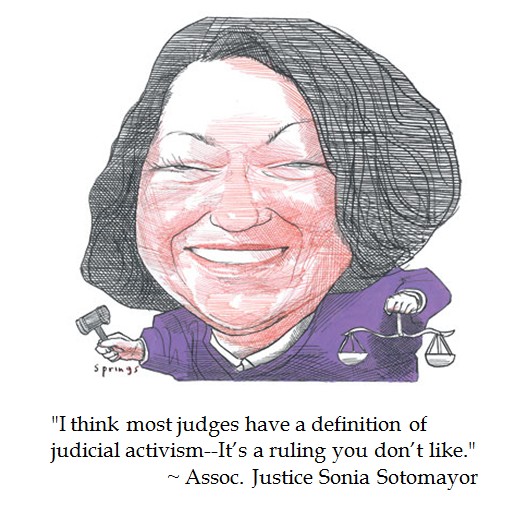When speaking before the Forum Club in Palm Beach and the Palm Beach County (Florida) Bar Association, Associate Supreme Court Justice Sonia Sotomayor dismissed concerns about judicial activism by denying that it exists. She later elaborated: "What you will find out is that both sides always base it on a legal
analysis. We don't come to our conclusions willy-nilly or arbitrarily. There won't be any decision you read where you will think
that a judge is an activist." But Sotomayor's pithy quip raises questions about her judicial philosophy.
While the "Wise Latina" has occasionally uttered allegiance the rule of law and that the role of a judge is not to make the law but to apply it, Sotomayor sometimes seems content to include herself in the process.
Sotomayor earned the moniker during her Senate confirmation hearings when she refused to renounce her inspiring words about being a "Wise Latina" judge who would make better decisions. Sotomayor tried to walk back the exclusivity of the exclamation, but that is hard when you say: "I would hope that a wise Latina woman with the richness of her experiences would more often than not reach a better conclusion than a while male who hasn't lived that life."
As Justice Sotomayor was publicizing her autobiographical book Mi mundo adorado / My Beloved World (2013), she revealed to the New York Times that:
“It is my great hope that I’ll be a great justice, and that I’ll write opinions that will last the ages. But that doesn’t always happen. More importantly, it’s only one measure of meaning in life. To me, the more important one is my values and my impact on people who feel inspired in any way by me....Serving as a role model is the most valuable thing I can do.”But does a consciousness on being a role model make for a sort of judicial activism which inserts the self into a rendering of justice?
Justice Sotomayor has been candid about how her unconventional background permeates her position. As she has said: "Since I have difficulty defining merit and what merit alone means - and in any context, whether it's judicial or otherwise - I accept that different experiences in and of itself, bring merit to the system." Moreover, Sotomayor has mused that: "Personal experiences affect the facts which judges choose to see." And Tea Party types hold that silly thought that justice is blind.
Justice Sotomayor has even reached out to the crumb chasers with her appearance on Sesame Street in which the dialogue sounded as leaden as the cafecita.
While the baby talk explanation of what her job is works for the kinder care sect, one wonders if it reveals a fundamental misunderstanding of Justice Sotomayor's role on the Supreme Court. Sotomayor describes her duties as being a judge who solves arguments by giving his or her opinion. Really? As the nation's highest court, SCOTUS determines the law not solving arguments. Is this done through giving one's opinion or through judicial interpretation (her opinion on the law)?
No wonder Justice Sotomayor does not believe in judicial activism as it seems like the root of her judicial philosophy with a veneer of the rule of law and the spiff of class conscious inspiration.


No comments:
Post a Comment